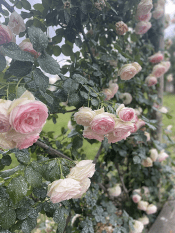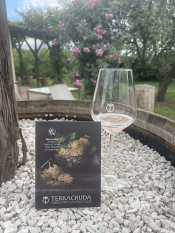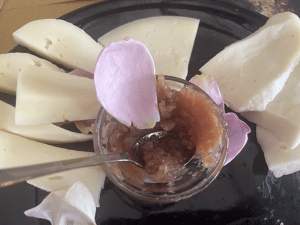A group of 17 community members and Lincoln Land Community College students traveled to Italy and are enjoying an auspicious experience — two weeks of rich history, culture, food, wine and friendships in the making throughout the Marche and Emelio Romani regions of northeastern Italy.

One of many stops was to visit the Terracruda Winery in Fratte Rossa, a small town outside the UNESCO heritage site in Urbino and just about an hour off of the Adriatic coast. The winding roads took us high up the hillside where arbors of blooming roses greeted us before sitting down to learn more about the wonderful wines the Avenanti and Berti families are producing in their certified organic vineyards.
Maintaining a certified organic winery takes time, and sulfur is dusted on the vines nearly once a week to prevent mildew which can harm the grapes. Bianchello, Aleatico and Sangiovese are the three grape varieties in production at Catina Terracruda. Bianchello di Metauro is the variety most famous in the Marche region, and this white grape varietal results in wines that are pale straw in color with plenty of aromatics and a delicate dryness perfect for the patio on a hot day alongside delicate seafood dishes.

The second variety, called Aleatico, is a lesser-known grape that previously was more typically used in blending, but that has been resurrected as a standalone wine in the last decade. One of the wines we tasted, the Terracruda Ortaia made from nearly 100% Aleatico grapes, was a fantastically floral red with a bouquet that was as if we had gathered up the roses and jasmine hanging along the winery’s arbors and stuffed them into the glass. This lightweight, easy drinking red would seamlessly pair with many dishes from charcuterie to ragu.
Another floral touch that was a highlight for many was the lovely accoutrement to the cured prosciutto and salumi we were served. The rose petal jam, homemade by the matriarch of the winery herself, was delicious with the soft, young Pecorino Toscana.
Finally, a common thread among the presentations at both Terracruda as well as from other agritourism sessions we experienced was the commitment to organic practices that not only avoid chemicals and pesticides but also cherish and uplift the age-old heritage of the product itself, making what is old somehow new again. That notion is exactly what traveling to another country is supposed to evoke — renewed inspiration to celebrate the roots that run deep. Slowing down, taking the time and making the effort to bring to fruition the traditions in time honored craftmanship.
If you would like to join us in May of 2026 when we again embark on a food, wine and cultural experience, please email Sheridan Lane to be added to the list to receive more information.

Rose petal jam
- 1.5 cups filtered water
- 2 oz. or roughly 2 cups lightly packed fresh rose petals
- 2 cups organic cane sugar
- 3 tablespoons fresh lemon juice
- 1 tsp. pectin
- Pick the rose petals, and gently submerge in a bowl of cool water to wash and/or remove any bugs or debris. Lay rose petals out on a towel, and pat dry.
- Place rose petals and fresh water (see amounts above) in a saucepan. Gently simmer uncovered for approximately 10 minutes.
- Stir in 1.5 cups of sugar (save ½ cup of sugar) and continue stirring until dissolved.
- Add lemon juice.
- Stir the remaining ½ cup of sugar and the pectin together, and slowly sprinkle into the cooking jam to avoid clumping. Allow the mixture to continue gently cooking for another 20 minutes until it begins to thicken.
- Serve with a Pecorino Toscano — a young, soft, sheep’s milk cheese.
About
Lincoln Land Community College offers credit programs in Culinary Arts, Hospitality Management and Baking/Pastry, and non-credit cooking and food classes through LLCC Community Education.
Cooking or food questions? Email epicuriosity101@llcc.edu.
